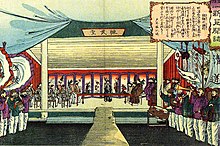Treaty of Ganghwa
| Japan-Korea Treaty of Amity | |||||||
 |
|||||||
| Japanese name | |||||||
|---|---|---|---|---|---|---|---|
| Kanji | 日朝修好条規 | ||||||
| Hiragana | にっちょうしゅうこうじょうき | ||||||
|
|||||||
| Korean name | |||||||
| Hangul | 강화도 조약 | ||||||
| Hanja | 江華島條約 | ||||||
|
|||||||
| Transcriptions | |
|---|---|
| Revised Hepburn | Nitchō-shūkōjōki |
| Transcriptions | |
|---|---|
| Revised Romanization | Ganghwado Joyak |
| McCune–Reischauer | Kanghwado Choyak |
The Japan–Korea Treaty of 1876, also known as the The Japan-Korea Treaty of Amity in Japanese or Treaty of Ganghwa Island in Korean, was made between representatives of the Empire of Japan and the Joseon Kingdom in 1876. Negotiations were concluded on February 26, 1876.
After the Industrial Revolution in the 18th century, European nations began to colonize many other nations in Africa and Asia under the political ideology known as Imperialism. Almost all of Africa was colonized by European Powers; most of Central, South and Southeast Asia including India were taken over by various European nations. East Asia also was invaded by foreign powers, beginning with the First Opium War (1839–1842) and Second Opium War (1856–1860) against China fought by Britain and other western powers; China's empire was reduced to a half-colonized territory. Meanwhile, the American Asiatic Squadron under the leadership of Matthew C. Perry forced Japan to open its ports to the western world in 1854.
Humiliated by unequal treaties and the prospect of losing its independence and integrity to imperialist powers, Japan embarked on a rapid transformation, successfully turning itself from a medieval society into a modern industrialized state.
In Korea, the strong dictatorship of Heungseon Daewongun was overthrown by Queen Min, who instituted a policy of closing doors to European powers. France and United States had already made several unsuccessful attempts to begin commerce with the Joseon dynasty, all of them happening during Heungseon Daewongun's era. However, after he was removed from power, many new officials who supported the idea of opening commerce with foreigners took power. While there was political instability, Japan developed a plan to open and exert influence on Korea before a European power could. In 1875, their plan was put into action: the Un'yō, a small Japanese warship under the command of Inoue Yoshika, was dispatched to survey coastal waters without Korean permission.
...
Wikipedia
